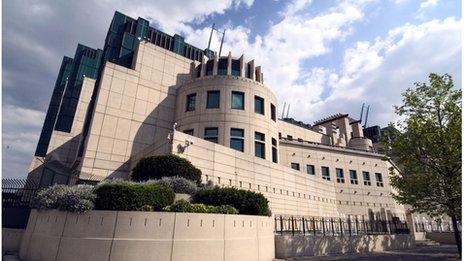Government scraps 'secret inquests' plan
- Published
- comments

Ministers have settled cases out of court rather than divulge information held by MI5, MI6 and others
The government has scaled back plans to hold more court hearings in secret, following criticism from civil liberties groups and Liberal Democrats.
A proposal to allow inquests involving sensitive intelligence to take place in private has been dropped from legislation to be published later.
Justice Secretary Ken Clarke said the plans had been "refined and improved".
But former director of public prosecutions Lord Macdonald said the concessions did not go far enough.
The BBC's security correspondent Gordon Corera said the government's original proposals had been fiercely criticised amid fears they would undermine the idea of open justice.
While Mr Clarke had made certain concessions, he said the "core principle" that certain cases could be heard in secret on security grounds was to be retained.
The government has argued the Justice and Security Bill will protect national security and allow cases dealing with sensitive subjects to be heard in full.
It says ministers have been forced to settle cases out of court for millions of pounds, including that of Binyam Mohamed and other former Guantanamo Bay detainees, rather than divulge information held by MI5, MI6 and others in open court.
'Hide mistakes'
Closed hearings are already used in limited circumstances, but ministers want to extend the procedures allowing them to all civil cases, including compensation claims and judicial challenges of ministerial decisions.
If the bill becomes law, special security-cleared lawyers would argue about the material in private, and defendants would also not be able to know the evidence used against them.
Now, following a campaign, Mr Clarke has said the proposals will be watered down and a plan for secret inquests dropped altogether.
It will now also be judges, rather than politicians, who decide whether evidence in civil cases should be heard in secret.
Mr Clarke told the BBC that British judges were very independent and they would have to be convinced there was a genuine "danger" to the public or to informants from evidence being heard in public to justify holding closed sessions.
No country allowed evidence from spies to be heard in public, he told Radio 4's Today programme, as this would lead to "terrorists sitting in the public gallery and taking notes".
"It is less than perfect but at the moment the alternative is silence," he said.
"You either have the judge hearing the evidence in closed material proceedings or, what happens at the moment is this evidence is never given at all. Sometimes you have the agencies and the government having to pay out millions of pounds to settle a claim which the agencies are still saying is unfounded."
The move was backed by Conservative MP and former barrister Robert Buckland who said it could result in "more material being disclosed".
Deputy Prime Minister, Nick Clegg, was among those who'd been critical of the plans and a senior party source told the BBC he had "worked incredibly hard within the coalition to ensure these proposals achieve the right balance between liberty and security".
'Offensive'
Lord Macdonald, now a Lib Dem peer, welcomed the concessions made so far but said they did not go far enough.
Ken Clarke: Bill "is less than perfect but the alternative is silence"
"People whose cases are decided against them on the basis of evidence they have never been allowed to see are still going to feel bitterly aggrieved by this sort of procedure," he told Today. "And some government wrongdoing in the area of national security is going to be less likely to see the light of day.
"So I think the bill still contains much that is offensive to our traditional notions of equal parties adjudicating cases in front of an impartial judge.
Labour said it would be scrutinising the bill carefully to see whether the government was truly meeting the concerns expressed.
"Ever since these proposals to fundamentally change our centuries old system of open justice were first published, the government has been sloppy in what is a complex and sensitive area of policy," said shadow justice secretary Sadiq Khan.
Cori Crider, legal affairs director of Reprieve, which campaigns for prisoners' rights, also said further changes were needed.
"It is deeply worrying that our government's response to its complicity in rendition and torture is not to strengthen our legal safeguards but to destroy them," he said. "This bill will ensure that our security services never have to face an open court - or the scrutiny of the media or British taxpayers - even when they are mixed up in the most serious crimes."
- Published29 May 2012
- Published29 May 2012
- Published4 April 2012
- Published16 November 2011
- Published4 April 2012
- Published6 March 2012